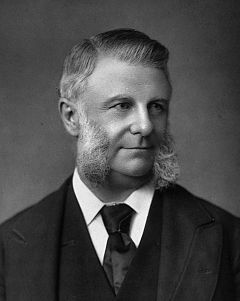Frederick Abel
| Sir Frederick Abel, Bt GCVO, KCB, FRS |
|
|---|---|
 |
|
| Born |
17 July 1827 London, England, UK |
| Died | 6 September 1902 (aged 75) |
| Nationality | English |
| Fields | chemistry |
| Alma mater | |
| Doctoral advisor | A. W. von Hofmann |
| Known for | cordite |
| Notable awards |
Royal Medal (1877) Albert Medal (1891) |
Sir Frederick Augustus Abel, 1st Baronet GCVO, KCB, FRS (17 July 1827 – 6 September 1902) was an English chemist.
Born in London as son of Johann Leopold Abel, Abel studied chemistry at the Royal Polytechnic Institution and in 1845 became one of the original 26 students of A. W. von Hofmann at the Royal College of Chemistry. In 1852 he was appointed lecturer in chemistry at the Royal Military Academy, Woolwich, succeeding Michael Faraday, who had held that post since 1829.
From 1854 until 1888 Abel served as ordnance chemist at the Chemical Establishment of the Royal Arsenal at Woolwich, establishing himself as the leading British authority on explosives. Three years later was appointed chemist to the War Department and chemical referee to the government. During his tenure of this office, which lasted until 1888, he carried out a large amount of work in connection with the chemistry of explosives.
One of the most important of his investigations had to do with the manufacture of guncotton, and he developed a process, consisting essentially of reducing the nitrated cotton to fine pulp, which enabled it to be safely manufactured and at the same time yielded the product in a form that increased its usefulness. This work to an important extent prepared the way for the "smokeless powders" which came into general use towards the end of the 19th century; cordite, the type adopted by the British government in 1891, was invented jointly by him and Sir James Dewar. He and Dewar were unsuccessfully sued by Alfred Nobel over infringement of Nobel's patent for a similar explosive called ballistite, the case finally being resolved in the House of Lords in 1895. He also extensively researched the behaviour of black powder when ignited, with the Scottish physicist Sir Andrew Noble. At the request of the British government, he devised the Abel test, a means of determining the flash point of petroleum products. His first instrument, the open-test apparatus, was specified in an Act of Parliament in 1868 for officially specifying petroleum products. It was superseded in August 1879 by the much more reliable Abel close-test instrument. Under the leadership of Sir Frederick Abel, first, Guncotton was developed at Waltham Abbey Royal Gunpowder Mills, patented in 1865, then, the propellant Cordite, patented in 1889. In electricity Abel studied the construction of electrical fuses and other applications of electricity to warlike purposes, and his work on problems of steel manufacture won him in 1897 the Bessemer medal of the Iron and Steel Institute, of which from 1891 to 1893 he was president.
...
Wikipedia
